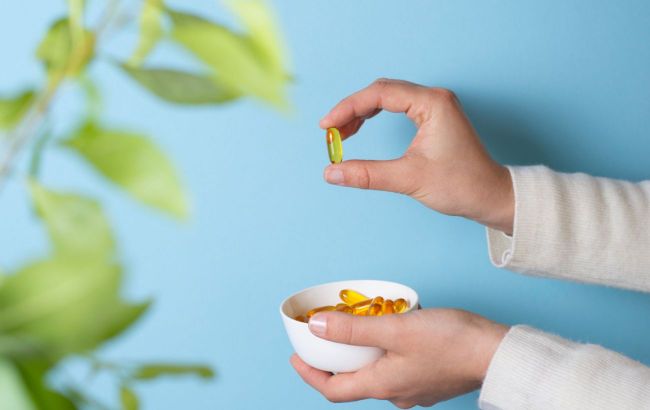Doctor explains how to take vitamin D and reveals overdose risks
 What you need to know about vitamin D (photo: Freepik)
What you need to know about vitamin D (photo: Freepik)
Vitamin D is one of the supplements frequently prescribed for prevention. It is indeed very important for maintaining health, but an excess of it in the body leads to a number of negative consequences. Dietitian Oksana Skytalinska explains what you need to know about vitamin D.
What you need to know about vitamin D
"Vitamin D enters the body in two ways: through the skin and from food. When sunlight hits the skin, a precursor molecule converts into sunshine vitamin D3 (cholecalciferol). Vitamin D is produced under sunlight on human skin from April to October, between 12:00 and 15:00," explains the doctor.
From food, the body receives vitamins D2 (ergocalciferol - plant origin) and D3 (cholecalciferol - animal origin).
Who is at risk of vitamin D deficiency
The ability to synthesize sunshine vitamin D through the skin decreases with age, putting older people at risk of deficiency.
"Patients with obesity are also at risk of vitamin D deficiency because subcutaneous fat tissue can sequester vitamin D, reducing its bioavailability," says Skytalinska.
Vitamin D entering the body is biologically inactive. The first phase of activation occurs in the liver. If a person has liver problems, a deficiency of vitamin D can occur.
"The second phase of activation happens in the kidneys. Therefore, if the kidneys are not functioning well, there will also be a problem with vitamin D deficiency," the dietitian explains.
What level of vitamin D is sufficient for health
The optimal concentration of vitamin D is 30-50 ng/ml, according to the latest recommendations.
"If, despite diligently taking the supplement in the prescribed dose, the vitamin level remains low, the problem may lie in the liver. Liver problems cause a severe deficiency of all fat-soluble vitamins, which cannot be replenished without treating the underlying liver disease. The second cause could be malabsorption syndrome," Skytalinska explains.
When taking large doses of vitamin D, it is recommended to regularly monitor creatinine levels in the blood and calcium levels in the blood serum and urine.
For prevention, a dose of 1000 IU/day is recommended.
"People with obesity need double the dose of vitamin D compared to their peers with normal body weight. Adults over 75 years old are also recommended double doses (e.g., 2000-4000 IU/day)," says the doctor.
She advises checking for hypersensitivity to vitamin D before starting treatment.
"Vitamin D works well with magnesium, calcium, and vitamin K. It does not work well with vitamin E and some medications (barbiturates, cardiac glycosides, phosphorus preparations)," adds the dietitian.
When and how to take vitamin D
"Fat-soluble vitamin D is better absorbed. However, water-soluble forms are suitable for people with fat absorption disorders, such as those with gallbladder, intestinal, or pancreatic diseases," notes Skytalinska.
It is best to take vitamin D in the morning or afternoon, as it reduces the synthesis of melatonin, the 'sleep hormone,' and can cause insomnia if taken in the evening.
"The vitamin should be taken with meals, and it is highly recommended that the food be quite fatty for maximum absorption," advises the dietitian.
Do not oversaturate the body with vitamin D; the recommended level in the blood is 40-80 ng/ml (100-200 nmol/l).
Dangers of excessive doses of vitamin D:
- damage to the liver
- osteoporosis
- calcium leaching from bones and depositing in blood vessels, kidneys, lungs, and heart
- potential to trigger cancer development
The doses of vitamin D should be individually selected by a doctor.
"The highest amount of vitamin D is found in fish oil and cod liver. Seafood, beef liver, chanterelle mushrooms, soft-boiled egg yolks, and dairy products follow with a significant gap," says Skytalinska.
Earlier, we wrote about what to eat to keep your bones strong and healthy.
This material is for informational purposes only and should not be used for medical diagnosis or self-treatment. Our goal is to provide readers with accurate information about symptoms, causes, and methods of detecting diseases. RBС-Ukraine is not responsible for any diagnoses that readers may make based on materials from the resource. We do not recommend self-treatment and advise consulting a doctor in case of any health concerns.

